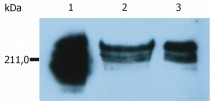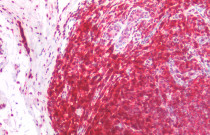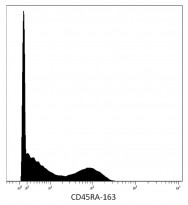ARG62863
anti-CD45RA antibody [MEM-56]
anti-CD45RA antibody [MEM-56] for CyTOF®-candidate,Flow cytometry,IHC-Formalin-fixed paraffin-embedded sections,Immunoprecipitation,Western blot and Human
Developmental Biology antibody; Immune System antibody; Neuroscience antibody; Signaling Transduction antibody; Mouse Inflammatory Cell Marker antibody; B Cell Marker antibody
Overview
| Product Description | Mouse Monoclonal antibody [MEM-56] recognizes CD45RA |
|---|---|
| Tested Reactivity | Hu |
| Tested Application | CyTOF®-candidate, FACS, IHC-P, IP, WB |
| Specificity | The clone MEM-56 reacts with CD45RA, a 205-220 kDa single chain type I glycoprotein, variant of CD45 (CD45RA isoform). CD45RA is expressed on most of B lymphocytes, resting and native T lymphocytes, medullar thymocytes and monocytes. HLDA IV; WS Code NL 907 |
| Host | Mouse |
| Clonality | Monoclonal |
| Clone | MEM-56 |
| Isotype | IgG2b |
| Target Name | CD45RA |
| Antigen Species | Human |
| Immunogen | Human thymocytes and T lymphocytes. |
| Conjugation | Un-conjugated |
| Alternate Names | LY5; GP180; Receptor-type tyrosine-protein phosphatase C; CD45; L-CA; CD antigen CD45; Leukocyte common antigen; CD45R; LCA; T200; EC 3.1.3.48; B220 |
Application Instructions
| Application Suggestion |
|
||||||||||||
|---|---|---|---|---|---|---|---|---|---|---|---|---|---|
| Application Note | IHC-P: No pre-treatment of tissue sections is essential. * The dilutions indicate recommended starting dilutions and the optimal dilutions or concentrations should be determined by the scientist. |
Properties
| Form | Liquid |
|---|---|
| Purification | Purified from ascites by protein-A affinity chromatography. |
| Purity | > 95% (by SDS-PAGE) |
| Buffer | PBS (pH 7.4) and 15 mM Sodium azide |
| Preservative | 15 mM Sodium azide |
| Concentration | 1 mg/ml |
| Storage Instruction | For continuous use, store undiluted antibody at 2-8°C for up to a week. For long-term storage, aliquot and store at -20°C or below. Storage in frost free freezers is not recommended. Avoid repeated freeze/thaw cycles. Suggest spin the vial prior to opening. The antibody solution should be gently mixed before use. |
| Note | For laboratory research only, not for drug, diagnostic or other use. |
Bioinformation
| Database Links |
Swiss-port # P08575 Human Receptor-type tyrosine-protein phosphatase C |
|---|---|
| Gene Symbol | PTPRC |
| Gene Full Name | protein tyrosine phosphatase, receptor type, C |
| Background | CD45 is a member of the protein tyrosine phosphatase (PTP) family. PTPs are known to be signaling molecules that regulate a variety of cellular processes including cell growth, differentiation, mitosis, and oncogenic transformation. This PTP contains an extracellular domain, a single transmembrane segment and two tandem intracytoplasmic catalytic domains, and thus is classified as a receptor type PTP. This PTP has been shown to be an essential regulator of T- and B-cell antigen receptor signaling. It functions through either direct interaction with components of the antigen receptor complexes, or by activating various Src family kinases required for the antigen receptor signaling. This PTP also suppresses JAK kinases, and thus functions as a regulator of cytokine receptor signaling. Alternatively spliced transcripts variants of this gene, which encode distinct isoforms, have been reported. [provided by RefSeq, Jun 2012] |
| Function | CD45: Protein tyrosine-protein phosphatase required for T-cell activation through the antigen receptor. Acts as a positive regulator of T-cell coactivation upon binding to DPP4. The first PTPase domain has enzymatic activity, while the second one seems to affect the substrate specificity of the first one. Upon T-cell activation, recruits and dephosphorylates SKAP1 and FYN. Dephosphorylates LYN, and thereby modulates LYN activity. (Microbial infection) Acts as a receptor for human cytomegalovirus protein UL11 and mediates binding of UL11 to T-cells, leading to reduced induction of tyrosine phosphorylation of multiple signaling proteins upon T-cell receptor stimulation and impaired T-cell proliferation. [UniProt] |
| Research Area | Developmental Biology antibody; Immune System antibody; Neuroscience antibody; Signaling Transduction antibody; Mouse Inflammatory Cell Marker antibody; B Cell Marker antibody |
| Calculated MW | 147 kDa |
| PTM | Heavily N- and O-glycosylated. |
Images (3) Click the Picture to Zoom In
-
ARG62863 anti-CD45RA antibody [MEM-56] WB image
Western blot: HUT-78 human cutaneous T cell lymphoma cell stained with 1) anti-human CD45 control antibody, 2) ARG62863 anti-CD45RA antibody [MEM-56] under non-reducing conditions, 3) ARG62863 anti-CD45RA antibody [MEM-56] under reducing conditions.
-
ARG62863 anti-CD45RA antibody [MEM-56] IHC-P image
Immunohistochemistry: Paraffin-embedded Human tonsil tissue stained with ARG62863 anti-CD45RA antibody [MEM-56] at 5 µg/ml dilution.
-
ARG62863 anti-CD45RA antibody [MEM-56] CyTOF image
CyTOF: Human peripheral blood stained with ARG62863 anti-CD45RA antibody [MEM-56] (163Dy). Singlet cells were gated for data analysis.
Clone References










